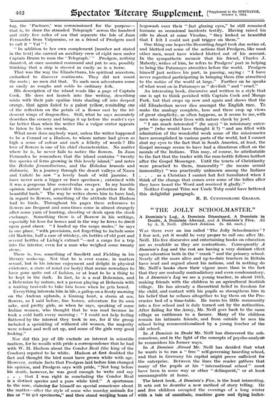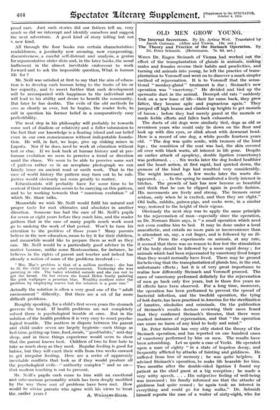"THE JOLLY SCHOOLMASTER."
A Dominie's Log, A Dominie Dismissed, A Dominie in Doubt, A Dominic Abroad, and. A Dominie's Five. All by A. S. Neil. (Herbert Jenkins. 2s. 6d. each. ) WAS there ever an inn called ` The Jolly Schoolmaster ' ? I fear not, yet it would be very proper to call one after Mr. Neill. His five discursive and entertaining books on education are as readable as they are contentious. Consequently A Dominie's Log and the rest are having a very distinct effect upon education both in the " crank " and the primary school. Nearly all the more alive and up-to-date teachers in Britain have read and argued about his notions, and in nothing do Mr. Neill's books show their vigour more than in the fact that they are mutually contradictory and even condemnatory. In A Dominie's Log we see a young teacher, in about 1915, making friends with the children in an agricultural Scottish village. He has already a theoretical belief in freedom for the child, and contact with his pupils so strengthens him in his belief that he refuses altogether to log them on the Pro- crustes bed of a time-table. He turns his little community into a free school and is duly turned out by the authorities. After failing for the Army, Mr. Neill goes back to the same village as cattleman to a farmer. Many of the children remain his intimate friends, and from outside he sees his school being reconventionalized by a young teacher of the old school.
In A Dominic in Doubt Mr. Neill has discovered the sub, conscious, and in the light of the concepts of psycho-analysis he reconsiders his former ways.
In A Dominic Abroad Mr. Neill has decided that what he wants is to run a " free " self-governing bearding school, and that in Germany his capital might prove sufficient for the enterprise. Between the lines the reader gathers that many of the pupils at his " international school " must have been in some way or other " delinquent," or at least unmanageable at home.
The latest book, A Dominie's Five, is the least interesting. It sets out to describe a new method of story telling. He and five children occupied the evenings of a long winter with a tale of cannibals, nuudduu guns and flying bullet.
proof cars. Just such stories did our fathers tell us, very much so did we interrupt and identify ourselves and suggest the next adventure. A good kind of story telling but not S new kind.
All through the four books run certain characteristics : readableness, a jocularity now amusing, now exasperating, discursiveness, a careful self-distrust and analysis, a genius for argumentative obiter dicta and, in the later books, the usual bafflement in the almost inevitable endeavour to work forward and to ask the impossible question, What is human life for ?
Mr. Neill was satisfied at first to say that the aim of educa- tion is to develop each human being to the limits of his or her capacity, and to assert further that such development will be accompanied with happiness to the individual and will lead to his ability and desire to benefit the community.
But later he has doubts. The evils of the old methods he sees as clearly as ever, but he begins, the reader feels, to call in question his former belief in a comparatively easy perfectibility.
The next step in his philosophy will probably be towards some sort of dualism or relativity and a fuller submission to the fact that our knowledge is a floating island and our belief even in our own consciousness without indisputable founda- tion. He will, in fact, we hope, give up sinking mines in Laputa. Nor if he does, need he work at education without test or clue. If we look back at human history and at pre-
human evolution we seem to perceive a trend or direction amid the chaos. We seem to be able to perceive some sort 1 f pattern rather as in an aeroplane photograph we can faintly trace an ancient road or earth work. That in the case of world history the pattern may turn out to be sub- jective would obviously not seem greatly to matter.
Educationists will probably have for some time to be content if their education seems to be carrying on this pattern, and to be working towards that " conscious evolution " of which Mr. Shaw talks.
Meanwhile we wish Mr. Neill would fulfil his natural and proper taste for root ultimates and absolutes in another direction. Someone has had the care of Mr. Neill's pupils for seven or eight years before they reach him, and the reader gathers that in the case of many pupils much work must go to undoing the work of that period. Won't he turn his attention to the problem of those years ? Many parents believe in the new education, mean to try it for their children, and meanwhile. would like to prepare them as well as they can. Mr. Neill would be a particularly good adviser in the matter because, unlike some Montessorians, for instance, he believes in the rights of parent and teacher and indeed has already a notion of some of the problems involved :—
" Mrs. Mac's problem is that of a million mothers ; she has to fit the child into an adult environment. Yesterday she . was painting in oils. The baker whistled outside and she ran out to get the bread. On her return she found Helen busily painting the pink wallpaper a prussian blue. Wealthy mothers solve the problem by employing nurses but the solution is a poor one."
Actually the solution is often a very good one of the " adult environment " difficulty. But there are a set of far more difficult problems.
Roughly speaking, for a child's first seven years the stomach governs the head. If health problems are not completely solved there is psychological trouble at once. But in the solution of the health problem it is very easy to court psycho- logical trouble. The matters in dispute between the parent and child under seven are largely hygienic—such things as bed-time, getting-up time, food, meals, "good habits," mid-day sleep, and in these things experience would seem to show that the parent knows best. Children of two to four hate to take as much sleep as they need. Regular_ feeding is good for babies, but they will exert their wills from two weeks onward to get irregular feeding. Here are a series of apparently inevitable conflicts that look as if they would produce all the psychological evils—" authority complex " and so on— that modern teaching is out to prevent.
Mr. Neill's pupils each come to him with an emotional and subconscious personality which has been deeply modified by the way these sort of problems have been met. How
would he advise parents who agree with his- views 'to "treat
A. Wir.r.r4ms-EL.ma.
- -



















































 Previous page
Previous page